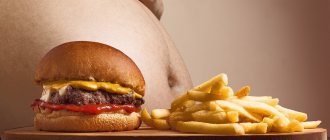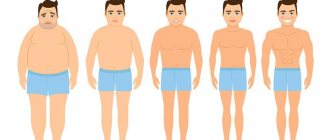"Airy" belly
As strange as it may sound, swallowing excess air
may lead to bloating. This can be a nervous habit, but it also often happens when you eat, chew, or are used to talking quickly.
Chewing gum can only make the problem worse.
Doctors often consider swallowing large amounts of air a symptom of other digestive system disorders, as well as psychological disorders such as anxiety and depression.
.
In addition, we often swallow more air than usual when we are worried and nervous. Every time we lose our breath and start gasping for air, not only does our stress level increase, but we also become bloated due to the amount of trapped air.
What to do?
- To stop swallowing more air, learn eat and drink slowly
.
- Chew food thoroughly with your mouth closed.
- Try don't talk while eating
.
- Avoid smoking as this also causes excess air.
- Give up carbonated drinks
, since they contain bubbles of carbon dioxide, which is released and leads to bloating and gas formation in the intestines.
- Meditate, go for a walk, or exercise to learn how to cope with stress and swallow less air.
Myths about losing belly fat
Losing belly fat is a complex, time-consuming and lengthy process. And before you understand how exactly you need to act, it is worth studying the following information:
- No amount of physical exercise will help remove belly fat. “Plank”, abdominal pumping, crunches affect the muscle tissue of the whole body and it is quite possible that overall weight loss will proceed quite quickly, and the stomach will remain large.
- The belly does not grow from any specific foods, so you should not torture yourself with strict diets, get carried away with eating “healthy” fats and deprive yourself of the pleasure of eating your favorite foods.
- Fractional nutrition does not affect the size of the abdomen. Yes, it normalizes the functioning of the entire digestive system and even corrects metabolism, but visceral fat remains unchanged.
- Stress and nervous breakdowns only affect the general state of health and eating habits (a person begins to “eat up” problems). These factors do not have any effect on the size of the abdomen.
- Wraps are a panacea. They really help tighten sagging skin on the abdomen, but only if the procedures are performed regularly, coupled with a contrast shower and massage. Even the most modern cosmetics and manipulations do not affect the internal fat, which makes the belly bulge.
"Water" belly
Water retention in the body occurs due to the accumulation of fluid in any part of the body. In this case we are talking about the stomach. Fluid accumulation is also one of the ways our body responds to stress.
.
A water belly can also be caused by an electrolyte imbalance. The most obvious example of water retention in the body is swelling of the arms and legs, but it can also happen to your stomach.
Most often, bloating due to water retention is temporary, and the body regains balance after the stressful situation passes.
However, in rare cases, swelling in the abdominal area may indicate cardiac, pulmonary, or kidney complications.
What to do?
- Monitor your weight and watch for drastic changes.
- Avoid consumption foods high in salt
, since salt promotes further water retention.
- Drink more water
. Although it seems counterintuitive, drinking enough water helps remove accumulated fluid in the body.
- Eat foods that have diuretic properties: green and black tea, parsley, watermelon and ginger.
- Lift up legs up
, lying on your back 3-4 times a day to improve blood and fluid circulation.
Why is my belly big but my body has lost weight?
If during the diet the body has noticeably lost weight, and the stomach is large (remained the same size or increased), then this may be associated with various pathologies, including:
- inflammatory process in the peritoneum;
- neoplasms in the uterus (the lower abdomen will be especially large);
- liver/gallbladder diseases (uneven abdominal volume is noted - it is larger in the upper part).
Only diagnostics of internal organs will help to understand the problem. During a medical examination, an accumulation of fluid in the peritoneum may be detected - ascites, which can be provoked by diseases of the heart, kidneys (the outflow of fluid is impaired, extensive and local swelling is noted), and cirrhosis of the liver (the problem is associated with the lack of a complete outflow of venous blood).
New growths in the uterus can cause an enlarged abdomen
Gas belly
Excess gases in the intestines appear not only due to swallowing large amounts of air, but also due to insufficient digestion of certain foods.
If you experience persistent burping after eating, certain foods may be to blame.
Cabbage, onions, legumes
and other fiber-rich foods produce gas as a byproduct of digestion.
Lactose, fructose and gluten intolerance can sometimes be the culprit
which lead to bloating and gas.
Gastrointestinal infections, chronic diseases and stomach disorders caused by bacteria can also lead to increased flatulence and bloating.
What to do?
- Identify foods that cause problems by eliminating them from your diet for a time.
- Eat more foods containing probiotics
to increase the number of beneficial bacteria in the intestines and improve digestion.
- Also try cutting back on fiber-rich foods for a while.
- Reduce do Minimum consumption of sweet and starchy foods,
until your gut health is restored.
Cystic belly
One of the obvious symptoms of an ovarian cyst is bloating. During your cycle, the ovaries release an egg into the follicles once a month. Sometimes the follicles do not produce an egg and the fluid inside the follicle causes a cyst to appear.
The size of the cyst can vary from microscopic to quite large
, like a ball or a watermelon.
Many women attribute this to excess weight, but abdominal pain and bloating can be a consequence of cyst growth. If you only notice a bulging belly and do not find a reason for the sudden weight gain, this is an alarming sign.
However, it is worth remembering that most ovarian cysts are harmless. Quite often you won't even feel symptoms and the cyst will disappear over time.
If you are concerned about pain in the pelvic area, discomfort in the lower abdomen and bleeding
, perhaps you should consult a doctor about this problem.
What to do?
- If the cyst has not ruptured or twisted, a functional cyst usually does not require intervention.
- However, your doctor may ask you undergo examination
to analyze the problem.
- In some cases, surgical removal of the cyst is suggested.
- If you are prone to developing ovarian cysts, it is recommended to have regular checkups.
Useful video
Watch the video about exercises to remove belly fat:
Similar articles
- How to remove the lower abdomen in women and men
Before mastering the methods of how to remove the lower abdomen, it is worth getting tested. After all, fat in men and women can be deposited due to illness. If no problems are identified, girls and boys can quickly get rid of it with exercises and liposuction. Read more - Why is my belly not losing weight or losing weight poorly, not...
The main reasons why the stomach and sides do not lose weight. What prevents you from losing weight when playing sports? Why is the stomach the last to lose weight? Why do my legs lose weight but not my stomach? How to get rid of lower belly fat. Read more
- How to remove fat from the chest, sides, abdomen, do it...
Before you remove fat from your breasts, you need to be examined by a doctor. This is especially true for men. A woman, a teenager, and a man will not be able to remove fat from the chest, sides, and abdomen without diet and exercise. Read more
Stomach from constipation
Constipation occurs when intestinal motility is slow or there is difficulty passing stool. As a result, a number of characteristic symptoms arise, such as:
- Feeling of fullness in the abdomen or pelvic area
- Intestinal spasms
- Heaviness and discomfort in the stomach and abdominal area
- Pain sensations radiating to the back
In reality, how often you have a bowel movement is subjective, and what is normal for one may not be normal for another.
You can have bowel movements 1-3 times a day or 3 times a week
, and if this is a regular and habitual thing, then this can be considered the norm. Less or frequent bowel movements may already be considered a problem.
A common cause of constipation is eating disorders. This is facilitated by the consumption of a small amount of fiber, as well as an insufficient amount of water. Constipation also often occurs during pregnancy, during dieting, taking certain medications, and lack of physical activity.
Constipated intestines become a favorable environment for the proliferation of harmful bacteria. The activity of these bacteria leads to the production of gases, which also causes bloating and belching.
Fasting days to cleanse the body
To get rid of a big belly, you need to start with cleansing the intestines. The easiest way is to introduce regular fasting days, which:
- promote the removal of stagnant feces;
- improve intestinal motility;
- serve to prevent the development of rotting during a heavy meal.
An additional “bonus” - as a result of a sharply limited diet, the metabolism receives an excellent “impetus” and accelerates.
It is important to carry out fasting days correctly and follow the recommendations of nutritionists:
- Unloading cannot be started suddenly.
- First, you need to systematically reduce the amount of food you eat, switch to a low-calorie diet, and only after that, when the body adequately perceives such changes, introduce “fasting” days.
- The optimal regime is a maximum of 2 fasting days per week. You need to start with one.
- A day before unloading, you need to give up “heavy” food and cancel dinner altogether. The next day after the fasting day should also be easy - only low-calorie foods should be included in the menu and in small quantities.
- During unloading you need to drink a lot all day - herbal teas without sugar and clean water. The volume of fluid consumed should be at least 2.5 liters per day.
You can unload on the following products:
| Products | How much to use |
| Kefir or natural yogurt no more than 1% fat | drink about 2 liters per day |
| Low-fat or low-fat cottage cheese without added sugar, honey, sour cream | 500 g of product are divided into equal 4-5 parts (according to the number of meals) |
| Vegetable soup without frying and adding animal fats, with a minimum of salt and spices | 1 liter per day, divided into equal portions |
| Fresh vegetables (cucumbers, tomatoes, pumpkin) | no more than 2 kg per day |
| Fruits (apples, pears, plums), except grapes and bananas | maximum 1 kg per day |
If the feeling of hunger on such a day is very disturbing, or dizziness or weakness appears, then you can eat a teaspoon of honey (dissolve in the mouth). During unloading, you should not engage in sports.
Fasting days are contraindicated when:
- any diseases of the stomach and intestines (you should definitely consult a doctor);
- unstable blood pressure;
- diabetes mellitus;
- removed gallbladder;
- gallstone disease.
Watch the video about the benefits and implementation of fasting days:










